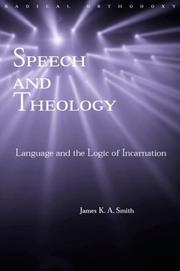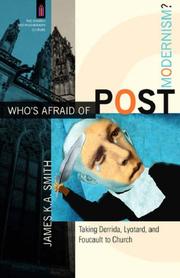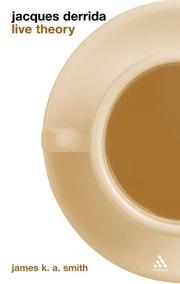| Listing 1 - 10 of 26 | << page >> |
Sort by
|

ISBN: 0415276969 9780415276962 9780415276955 0415276950 0203995279 9780203995273 0203463242 9780203463246 113447394X 1283642220 1280112352 1134473931 Year: 2002 Publisher: London New York Routledge
Abstract | Keywords | Export | Availability | Bookmark
 Loading...
Loading...Choose an application
- Reference Manager
- EndNote
- RefWorks (Direct export to RefWorks)
God is infinite, but language finite; thus speech would seem to condemn Him to finitude. In speaking of God, would the theologian violate divine transcendence by reducing God to immanence, or choose, rather, to remain silent? At stake in this argument is a core problem of the conditions of divine revelation. How, in terms of language and the limitations of human understanding, can transcendence ever be made known? Does its very appearance not undermine its transcendence, its condition of unknowability?Speech and Theology posits that the paradigm for the encounter between the material and the divine, or the immanent and transcendent, is found in the Incarnation: God's voluntary self-immersion in the human world as an expression of His love for His creation. By this key act of grace, hinged upon Christs condescension to human finitude, philosophy acquires the means not simply to speak of perfection, which is to speak theologically, but to bridge the gap between word and thing in general sense.
Christianity --- Incarnation. --- Language and languages --- Philosophy. --- Religious aspects --- Christianity. --- 21*015 --- Theologie en taal --- 21*015 Theologie en taal --- Incarnation --- Foreign languages --- Languages --- Anthropology --- Communication --- Ethnology --- Information theory --- Meaning (Psychology) --- Philology --- Linguistics --- Kenosis (Theology) --- Philosophy --- Religious aspects&delete& --- Christianity and language --- Christianity - Philosophy. --- Language and languages - Religious aspects - Christianity.
Book
ISBN: 9780801035791 0801035791 Year: 2017 Volume: 3 Publisher: Grand Rapids Baker Academic
Abstract | Keywords | Export | Availability | Bookmark
 Loading...
Loading...Choose an application
- Reference Manager
- EndNote
- RefWorks (Direct export to RefWorks)
In this culmination of his widely read and highly acclaimed Cultural Liturgies project, James K. A. Smith examines politics through the lens of liturgy. What if, he asks, citizens are not only thinkers or believers but also lovers? Smith explores how our analysis of political institutions would look different if we viewed them as incubators of love-shaping practices--not merely governing us but forming what we love. How would our political engagement change if we weren't simply looking for permission to express our "views" in the political sphere but actually hoped to shape the ethos of a nation, a state, or a municipality to foster a way of life that bends toward shalom? This book offers a well-rounded public theology as an alternative to contemporary debates about politics. Smith explores the religious nature of politics and the political nature of Christian worship, sketching how the worship of the church propels us to be invested in forging the common good. This book creatively merges theological and philosophical reflection with illustrations from film, novels, and music and includes helpful exposition and contemporary commentary on key figures in political theology.
Christianity and politics. --- Public theology. --- Political theology. --- Theology, Doctrinal --- Public theology --- Political theology --- Christianity --- Church and politics --- Politics and Christianity --- Politics and the church --- Political science --- Political aspects --- Christianity and politics --- 241.1*31 <73> --- 241.1*31 <73> Politieke theologie. Bevrijdingstheologie. Ethiek van de revolutie--Verenigde Staten van Amerika. VSA. USA --- Politieke theologie. Bevrijdingstheologie. Ethiek van de revolutie--Verenigde Staten van Amerika. VSA. USA
Book
ISBN: 9780801035777 0801035775 Year: 2009 Volume: 1 Publisher: Grand Rapids Baker Academic
Abstract | Keywords | Export | Availability | Bookmark
 Loading...
Loading...Choose an application
- Reference Manager
- EndNote
- RefWorks (Direct export to RefWorks)
Desiring the Kingdom focuses education around the themes of liturgy, formation, and desire. The author contends--as did Augustine--that human beings are "desiring agents"; in other words, we are what we love. Postmodern culture, far from being "secular," is saturated with liturgy, but in places such as malls, stadiums, and universities. While these structures influence us, they do not point us to the best of ends. Smith aims to move beyond a focus on "worldview" to see Christian education as a counter-formation to these secular liturgies. His ultimate purpose is to re-vision Christian education as a formative process that redirects our desire toward God's kingdom and its vision of flourishing. --from publisher descriptioin
Liturgics. --- Christianity and culture. --- Liturgical adaptation. --- Christianity --- Philosophy. --- Christianity and culture --- Liturgical adaptation --- Liturgics --- 261.6 --- 264 --- Liturgiology --- Liturgy --- Public worship --- Liturgies --- Adaptation, Liturgical --- Contextualization (Christian theology) --- Culture and Christianity --- Inculturation (Christian theology) --- Indigenization (Christian theology) --- Culture --- 261.6 De Kerk en de cultuur: christelijke beschaving; Kerk en vooruitgang; Kerk en wereld --- De Kerk en de cultuur: christelijke beschaving; Kerk en vooruitgang; Kerk en wereld --- Philosophy --- Christianity - Philosophy.
Book
ISBN: 9780801035784 0801035783 Year: 2013 Volume: 2 Publisher: Grand Rapids Baker Academic
Abstract | Keywords | Export | Availability | Bookmark
 Loading...
Loading...Choose an application
- Reference Manager
- EndNote
- RefWorks (Direct export to RefWorks)
How does worship work? How exactly does liturgical formation shape us? What are the dynamics of such transformation? In the second of James K. A. Smith's three-volume theology of culture, the author expands and deepens the analysis of cultural liturgies and Christian worship he developed in his well-received Desiring the Kingdom. He helps us understand and appreciate the bodily basis of habit formation and how liturgical formation--both "secular" and Christian--affects our fundamental orientation to the world. Worship "works" by leveraging our bodies to transform our imagination, and it does this through stories we understand on a register that is closer to body than mind. This has critical implications for how we think about Christian formation. Professors and students will welcome this work as will pastors, worship leaders, and Christian educators. The book includes analyses of popular films, novels, and other cultural phenomena, such as The King's Speech, Rise of the Planet of the Apes, David Foster Wallace's Infinite Jest, and Facebook.
Worship. --- Liturgics. --- Liturgy and the arts. --- Imagination. --- Philosophical anthropology. --- Imagination --- Liturgics --- Liturgy and the arts --- Philosophical anthropology --- Worship --- 264 --- Cult --- Cultus --- Religion --- Theology, Practical --- Fire-worshipers --- Anthropology, Philosophical --- Man (Philosophy) --- Civilization --- Life --- Ontology --- Humanism --- Persons --- Philosophy of mind --- Arts and liturgy --- Arts --- Liturgiology --- Liturgy --- Public worship --- Liturgies --- Imagery, Mental --- Images, Mental --- Mental imagery --- Mental images --- Educational psychology --- Intellect --- Psychology --- Reproduction (Psychology) --- Philosophy
Book
ISBN: 9780802861849 0802861849 Year: 2010 Publisher: Grand Rapids: Eerdmans,
Abstract | Keywords | Export | Availability | Bookmark
 Loading...
Loading...Choose an application
- Reference Manager
- EndNote
- RefWorks (Direct export to RefWorks)
Book
ISBN: 9781602580688 Year: 2008 Publisher: Waco, Tex. Baylor University Press
Abstract | Keywords | Export | Availability | Bookmark
 Loading...
Loading...Choose an application
- Reference Manager
- EndNote
- RefWorks (Direct export to RefWorks)
Philosophy and psychology of culture --- Religious studies --- Sociology of culture
Book
ISBN: 9789023956730 Year: 2019 Publisher: Utrecht KokBoekencentrum Uitgevers
Abstract | Keywords | Export | Availability | Bookmark
 Loading...
Loading...Choose an application
- Reference Manager
- EndNote
- RefWorks (Direct export to RefWorks)

ISBN: 080102918X 9780801029189 Year: 2006 Publisher: Grand Rapids Baker
Abstract | Keywords | Export | Availability | Bookmark
 Loading...
Loading...Choose an application
- Reference Manager
- EndNote
- RefWorks (Direct export to RefWorks)
Christianity --- Postmodernism --- Philosophy --- Religious aspects --- Derrida, Jacques. --- Foucault, Michel --- Lyotard, Jean-François

ISBN: 0826462812 Year: 2005 Publisher: London Continuum
Abstract | Keywords | Export | Availability | Bookmark
 Loading...
Loading...Choose an application
- Reference Manager
- EndNote
- RefWorks (Direct export to RefWorks)
Book
ISBN: 9781481313728 148131372X 9781481314220 9781481313742 Year: 2021 Publisher: Waco, Texas Baylor University Press
Abstract | Keywords | Export | Availability | Bookmark
 Loading...
Loading...Choose an application
- Reference Manager
- EndNote
- RefWorks (Direct export to RefWorks)
Christian philosophy and philosophy of religion tend to be dominated by analytic approaches, which have brought a valuable logical rigor to the discussion of matters of belief. However, the perspectives of continental philosophy--in particular, the continental emphasis on embodied forms of knowing--still have much to offer to the conversation and our understanding of what it means to be both rational and faithful in a postmodern world. The Nicene Option represents the full sweep of James K. A. Smith's work in continental philosophy of religion over the past twenty years. Animated by the conviction that a philosophy of religion needs to be philosophical reflection on the practice of religion, as a "form of life" (as Wittgenstein would say), this book makes the case for the distinct contribution that phenomenology--as a philosophy of experience--can make to philosophy of religion and Christian philosophy. Engaging a range of philosophers in this tradition, including Edmund Husserl, Martin Heidegger, Jacques Derrida, Emmanuel Levinas, Maurice Merleau-Ponty, Jean-Luc Marion, Richard Rorty, and Charles Taylor, Smith's constructive proposal coheres around what he describes as "the logic of incarnation," a "Nicene option" in contemporary philosophy of religion. By grounding philosophy of religion in the doctrinal heart of Christian confession, Smith gestures toward a uniquely robust Christian philosophy. Besides issuing a clarion call for the renaissance of continental philosophy of religion, The Nicene Option also offers a glimpse behind the scholarly curtain for a wider audience of readers familiar with Smith's popular works such as Who's Afraid of Postmodernism?, Desiring the Kingdom, Imagining the Kingdom, and You Are What You Love--all of which are tacitly informed by the phenomenological approach articulated in this book. As an extended footnote to those works--which for many readers have been gateways to philosophy-- The Nicene Option presents an invitation to a new depth of reflection.
Philosophy and religion --- Philosophical theology --- Continental philosophy --- Phenomenology --- Derrida, Jacques
| Listing 1 - 10 of 26 | << page >> |
Sort by
|

 Search
Search Feedback
Feedback About UniCat
About UniCat  Help
Help News
News